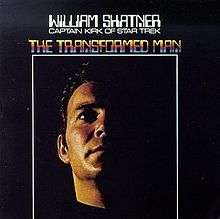The Transformed Man
The Transformed Man is the debut album by actor William Shatner. It was originally released in 1968 by Decca Records (Cat. #DL 75043), while Shatner was still starring in the original Star Trek series, and began his musical career. The album's cover nicknamed Shatner "Captain Kirk of Star Trek" most likely to boost sales and appeal to fans of the show. The concept of the album was to juxtapose famous pieces of poetry with their modern counterparts, pop lyrics. The album is best remembered for showcasing Shatner's now-famous vocal style—spoken word with dramatic pauses and flourishes. In the decades since its release, most of the album's tracks have been used satirically, either on compilation albums meant to showcase bad celebrity singing (the Rhino Records "Golden Throats" series) or by radio disc jockeys looking for laughs. On the other hand, many praise the album in the genre of spoken-word music.
| The Transformed Man | ||||
|---|---|---|---|---|
 | ||||
| Studio album by | ||||
| Released | 1968 | |||
| Recorded | 1968 | |||
| Genre | Spoken word | |||
| Length | 37:08 | |||
| Label | Decca | |||
| Producer | Don Ralke | |||
| William Shatner chronology | ||||
| ||||
Critical reception
| Review scores | |
|---|---|
| Source | Rating |
| AllMusic | |
| Encyclopedia of Popular Music | |
In a retrospective review in 2011, Greg Prato of music database website AllMusic rated The Transformed Man four-and-a-half out of a possible five stars, although with serious reservations. He stated that when listening to the album, "it's unclear if Shatner is merely having a good time and goofing around, or if he's embarrassingly dead serious, and creating an overly indulgent work. Most of the album turns out to be a bit too tedious..." He also noted that "you cannot tell if Shatner is play-acting or painfully serious. The result is a must hear, (unintentional?) comedy classic," comparing this attraction to that of comedian Andy Kaufman.[1]
However, in 2006, Q magazine ranked The Transformed Man No. 45 in their list of the 50 worst albums ever.[3][4]
In 2000 it was voted number 3 in the All-Time Worst Albums Ever Made from Colin Larkin's All Time Top 1000 Albums.[5]
Furthermore, in 2016, the website Alternative Nation crowned the album number 1 on a "Top 10 Musical Oddities" list.[6]
In 2020, the Riot Act Podcast ranked it at #11 on their worst albums of all time list, during the continuous segment, 'Broken Records', in which the duo hosts of Remfrey Dedman and Stephen Hill, attempt to find the worst album ever made. The album is currently featured alongside the likes of Bob Dylan, Lou Reed and Viva Brother.
Track listing
| No. | Title | Length |
|---|---|---|
| 1. | "King Henry the Fifth/Elegy for the Brave" (Don Ralke · Frank Davenport) | 6:16 |
| 2. | "Theme from Cyrano/Mr. Tambourine Man" (Music by Don Ralke/Translation by Frank Davenport · Bob Dylan) | 6:49 |
| 3. | "Hamlet/It Was a Very Good Year" (Don Ralke · Ervin Drake) | 7:45 |
| 4. | "Romeo and Juliet/How Insensitive (Insensatez)" (Ralke · Antônio Carlos Jobim/Vinícius de Moraes/English Lyrics by Norman Gimbel) | 6:46 |
| 5. | "Spleen/Lucy in the Sky with Diamonds" (Music by Don Ralke/Words and Translation by Frank Davenport · John Lennon/Paul McCartney) | 5:54 |
| 6. | "The Transformed Man" (Frank Davenport/Don Ralke) | 3:38 |
Personnel
- Don Ralke – producer
- Erick Labson – mastering
- Charles Bud Dant – executive producer
- Frank Davenport – English translation (poems)
- Ryan Null – photo research (reissue)
- Mike Ragogna – reissue producer
- William Shatner – liner notes
See also
References
- Prato, Greg. The Transformed Man - William Shatner at AllMusic. Retrieved December 25, 2011.
- Larkin, Colin (2007). Encyclopedia of Popular Music (4th ed.). Oxford University Press. ISBN 978-0195313734.
- "Q Lists". rocklistmusic.co.uk. Retrieved 2008-06-14.
- "The 50 Worst Albums Ever". Q (Q238). May 2006.
- Colin Larkin (2000). All Time Top 1000 Albums (3rd ed.). Virgin Books. p. 28. ISBN 0-7535-0493-6.
- "Top 10 Musical Oddities". alternativenation.net. Retrieved 2016-08-02.
External links
- "William Shatner Sings!". Archived from the original on 2006-10-14.
- Liner Notes from Diversionprojects.org